Booster K1 Humanoid Robot: Price, Specs & Buying Guide

Booster K1 Humanoid Robot: Complete Procurement Guide (2026)
Competition-validated embodied AI platform for research, education, and robotics development. Winner of RoboCup 2025 KidSize Humanoid League.
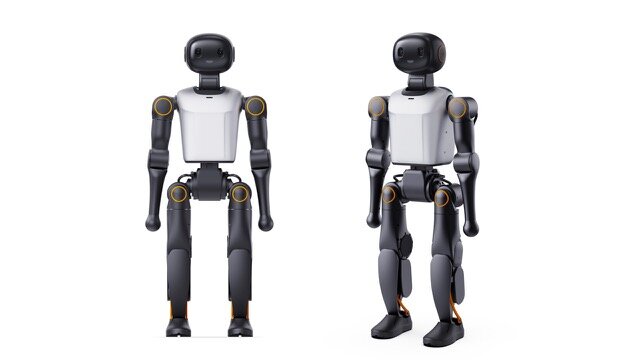
Request Quote - North America
2-4 week delivery • Volume discounts available • Research grant assistance
Quick Answers
Essential information for institutional buyers evaluating the Booster K1 platform
Is the Booster K1 suitable for serious research?
Yes. The K1 won both 1st and 2nd place at RoboCup 2025 KidSize league with an 11-0 championship victory, validating its competition-grade durability and performance. The platform is used by over 70 universities and research institutions globally for robotics research, embodied AI development, and STEM education.
How does the Booster K1 compare to Unitree G1?
The K1 costs $12,500 ($3,500 less than G1's $16,000), weighs 19.5kg (vs. 35kg), and offers proven RoboCup championship validation. The K1 is ideal for budget-focused institutions prioritizing portability and competition-proven performance. The G1 provides longer battery life (~2 hours vs. 40-80 minutes) and slightly taller stature (127cm vs. 95cm).
What AI computing power does the Booster K1 offer?
The K1 is configurable from 40 TOPS (EDU edition) to 200 TOPS (Pro edition) using NVIDIA Jetson Orin NX, enabling on-board neural network deployment without cloud dependency. The 40 TOPS EDU variant supports real-time vision processing, speech recognition, and motion planning with 10-25W power efficiency.
See the RoboCup Champion in Action
Watch the Booster K1 demonstrate bipedal locomotion, dynamic movements, and embodied AI capabilities
What is the Booster K1 Humanoid Robot?
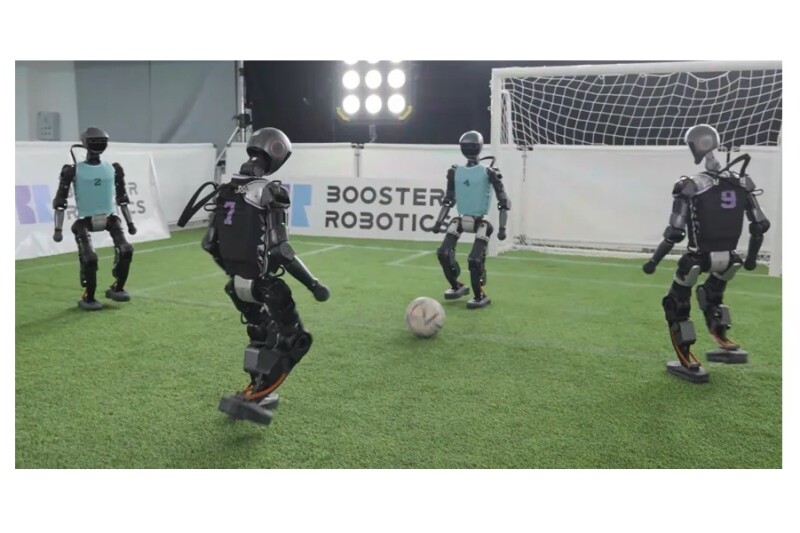
The Booster K1 is a compact, 95-centimeter humanoid robot developed by Beijing-based Booster Robotics specifically for education, research institutions, and robotics competitions. Launched in October 2025, the K1 represents a new generation of accessible embodied AI development platforms designed to lower the barrier to humanoid robotics while maintaining research-grade capabilities.
At RoboCup 2025 in Salvador, Brazil, the K1 platform achieved remarkable validation when Germany's Boosted HTWK team won the KidSize Humanoid League championship, defeating the Chinese TH-MOS team 11-0 in the final on July 20, 2025. Both finalist teams used identical K1 hardware, making this a pure test of AI algorithms and software development—precisely the type of challenge the platform was designed to enable.
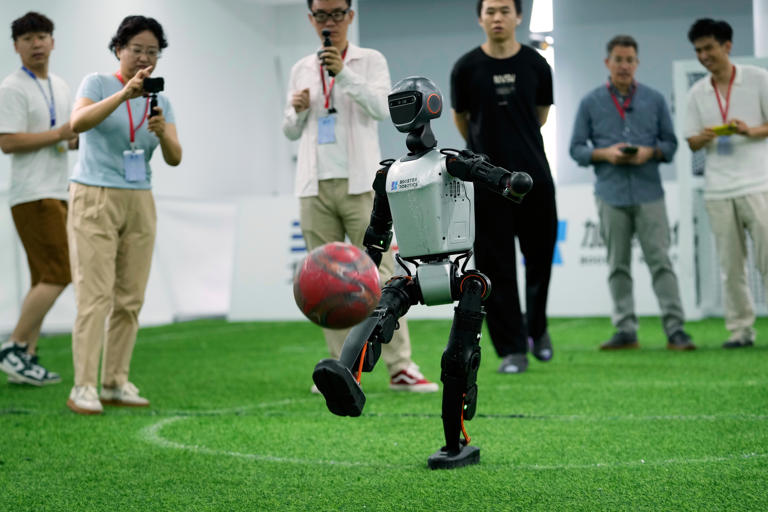
Founded in August 2023 by engineers from Tsinghua University's Robot Control Lab, Booster Robotics has shipped over 700 humanoid units globally, serving more than 200 clients across 20+ countries and 70+ universities and research institutions.
Booster K1 Configurations & Pricing

Booster Robotics offers the K1 in three configurations to meet different research and education needs. All variants feature the same 22-degree-of-freedom hardware platform with identical mechanical specifications (95cm height, 19.5kg weight), differing primarily in computing power, battery life, and warranty coverage:
K1 Geek Edition
- ✓ 48 TOPS AI computing
- ✓ 50-minute battery life
- ✓ 3-month warranty
- ✓ International pricing
K1 EDU Edition
- ✓ 40-117 TOPS AI computing
- ✓ 80-minute battery life
- ✓ 1-year warranty & support
- ✓ North American distribution
K1 Pro Edition
- ✓ 200 TOPS AI computing
- ✓ 80-minute battery life
- ✓ 1-year warranty
- ✓ Advanced research applications
Global Availability & Procurement
The Booster K1 is available worldwide through authorized distributors with regional warranty and support
Complete Technical Specifications
| Physical Dimensions | Height: 95cm (0.95m) | Weight: 19.5kg (43 lbs) |
| Degrees of Freedom | 22 DOF total: Legs (6 DOF × 2), Arms (4 DOF × 2), Head (2 DOF) |
| Joint Range | Hip: P -170° to 100°, R -23° to +90°, Y ±60° | Knee: 0° to 130° | Ankle: P -50° to 20°, R ±20° |
| Actuation System | Full-force-controlled dual-encoder joints with hybrid torque/velocity/position control | Max knee torque: 60 N·m |
| Computing | NVIDIA Jetson Orin NX 8GB | 40-200 TOPS AI inference (INT8) | 512 CUDA cores, 64 Tensor Cores | 10-25W power consumption |
| Sensors | RGBD depth camera | 9-axis IMU | Microphone array | Speaker | Touch sensors |
| Battery & Runtime | 40 minutes active use (Geek) | 80 minutes (Edu/Pro) | Hot-swappable battery |
| Connectivity | Wi-Fi 6 | Bluetooth 5.2 | Gigabit Ethernet | 5G support (optional) |
| Software | ROS2 compatible | Python & C++ APIs | TensorRT, CUDA, cuDNN support |
| Simulation | Isaac Sim, MuJoCo, Webots, Gazebo support | Open-source RoboCup framework on GitHub |
| AI Capabilities | On-board vision processing | TTS & ASR support | YOLO algorithm support | Edge LLM compatible |
| Portability | Includes dedicated carrying case | Out-of-box ready | Remote control, charger, documentation included |
Booster K1 vs. Unitree G1: Side-by-Side Comparison
The Booster K1 and Unitree G1 both target the education and research market as compact, budget-friendly humanoid platforms. However, the K1 offers significant cost savings at $12,500 compared to the G1's $16,000 base price—a $3,500 difference (22% savings). While the G1 provides longer battery life and slightly more computing power in its EDU configuration, the K1's RoboCup championship validation and exceptional portability make it compelling for budget-conscious institutions prioritizing proven competition performance.
| Feature | Booster K1 | Unitree G1 Base |
|---|---|---|
| US Price | $12,500 | $16,000 |
| Savings | Save $3,500 (22%) | Base price |
| RoboCup 2025 | 🏆 Champion | Used by teams |
| Height | 95 cm | 127 cm |
| Weight | 19.5 kg | 35 kg |
| Portability | ✓ Single case | Larger form |
| Degrees of Freedom | 22 DOF | 23 DOF |
| Battery Life | 40-80 minutes | ~2 hours |
| AI Computing | 40-200 TOPS | 100 TOPS (EDU) |
| Best For | Budget-focused education, RoboCup teams, portable labs | Extended runtime needs, taller platform requirements |
Bottom Line: The K1 delivers championship-proven performance at $3,500 less than the Unitree G1, making it ideal for educational institutions prioritizing portability, proven competition success, and budget efficiency.
Booster K1 vs. NAO: Next-Generation Advantage
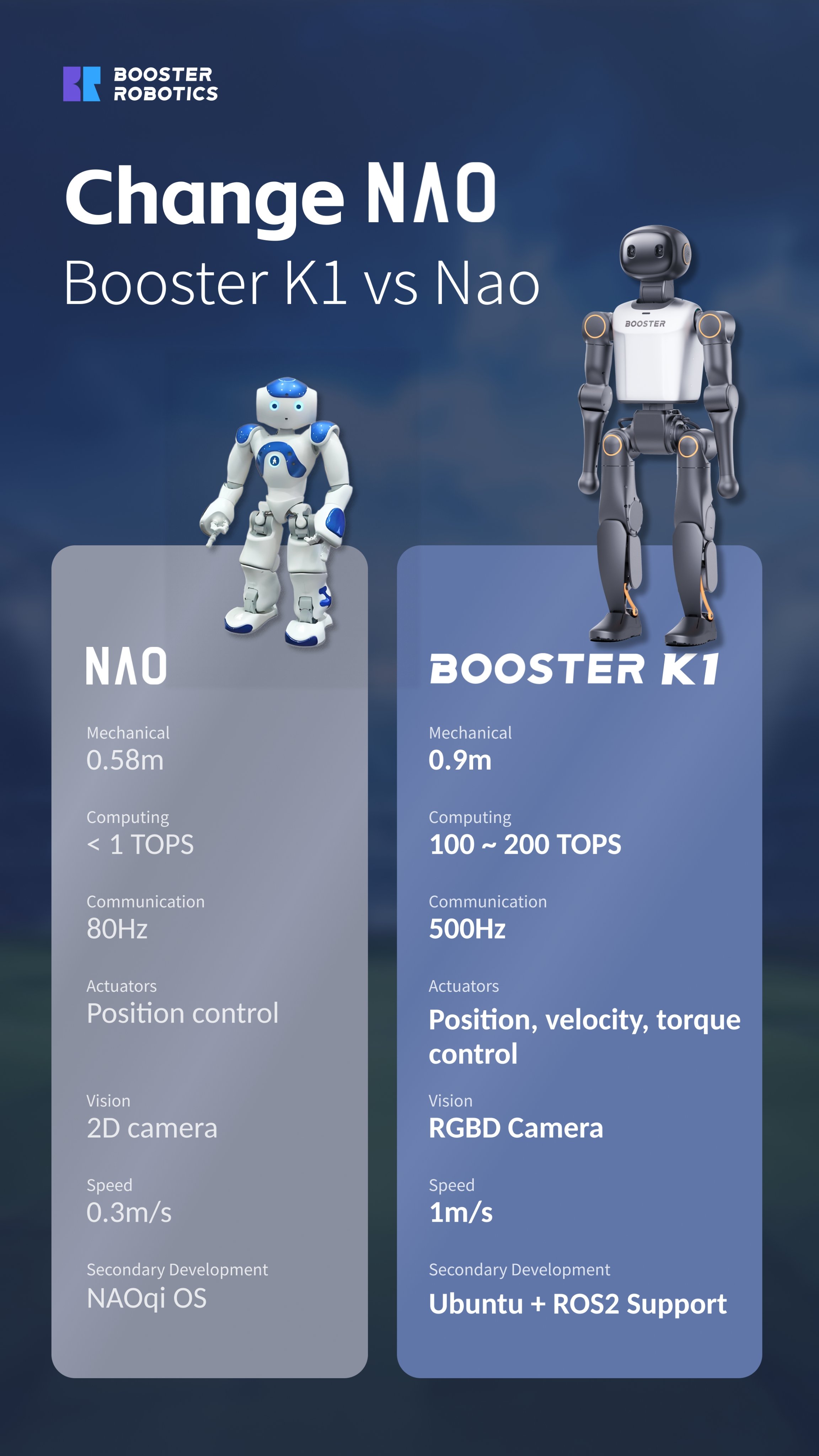
While NAO pioneered educational humanoid robotics, the Booster K1 represents the next generation with 100-200x more computing power, modern ROS2 architecture, and force-controlled actuation. The K1's NVIDIA Orin NX enables on-board deep learning deployment that would require cloud connectivity on NAO's ARM-based system.
Research Applications & Use Cases
The K1's combination of accessible pricing, competition-validated hardware, and open development platform makes it suitable for diverse embodied AI research applications
RoboCup & Robotics Competitions
Won both first and second place at RoboCup 2025 KidSize league. Durability validated by 30 hours of 500N impact testing. Ideal for teams preparing for RoboCup, WRC, and international robotics competitions.
STEM Education & Curriculum Development
SDK and Python/C++ APIs optimized for teaching. Supports robotics education from K-12 through university level. Part of "Hundred Cities, Ten Thousand Schools" initiative targeting 10,000+ educational institutions globally.
AI & Machine Learning Development
40-200 TOPS NVIDIA Orin NX enables on-board neural network deployment without cloud dependency. Ideal for reinforcement learning, sim-to-real transfer (Isaac Sim, MuJoCo), and embodied AI algorithm development.
Human-Robot Interaction Studies
Multimodal sensors (depth camera, microphone array, speaker, touch sensors) enable rich interaction research. Child-sized form factor (95cm) and safe force-controlled joints ideal for educational HRI studies.
Bipedal Locomotion & Gait Research
Full-force-controlled dual-encoder joints with hybrid torque/velocity/position control. Wide joint ranges (knee: 0-130°) support diverse locomotion research including walking, running, balancing, and terrain adaptation.
Vision & Perception Research
RGBD depth camera provides 3D environmental perception for object recognition, SLAM research, and visual navigation. YOLO algorithm support enables real-time object detection. Deploy custom vision models locally.
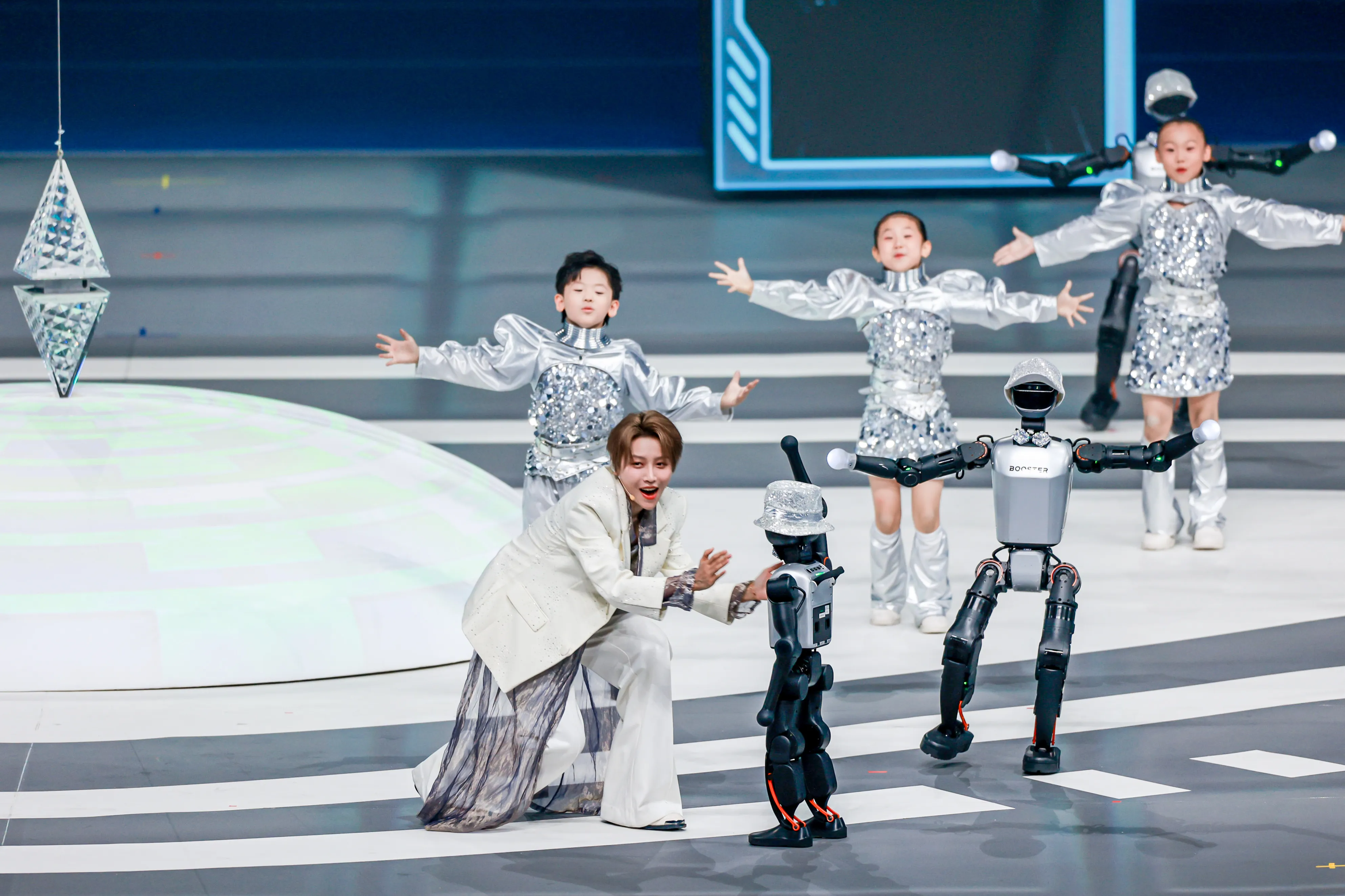
Frequently Asked Questions
How much does the Booster K1 cost?
The Booster K1 is available in three configurations: Geek Edition ($4,999-$5,999) with 48 TOPS computing, EDU Edition ($12,500) with 40-117 TOPS computing and US warranty, and Pro Edition (contact for pricing, typically $15,000-$18,000) with 200 TOPS computing. North American buyers receive 2-4 week delivery with comprehensive warranty coverage.
Did the Booster K1 win RoboCup 2025?
Yes. At RoboCup 2025 in Salvador, Brazil, the Booster K1 platform won both first and second place in the KidSize Humanoid League on July 20, 2025. Germany's Boosted HTWK team defeated China's TH-MOS team 11-0 in the final, with both teams using identical K1 hardware. HTWK Leipzig received their K1 robots in April 2025 and achieved world championship status just three months later.
What are the differences between K1 Geek, Edu, and Pro editions?
All K1 variants share identical 22-DOF mechanical hardware (95cm height, 19.5kg weight) but differ in computing power, battery life, and warranty. Geek Edition offers 48 TOPS, 50-minute battery, 3-month warranty. EDU Edition provides 40-117 TOPS, 80-minute battery, 1-year warranty with enhanced support. Pro Edition features 200 TOPS, 80-minute battery, 1-year warranty for deploying complex AI algorithms.
Which universities are using the Booster K1?
Over 70 universities and research institutions globally have deployed Booster robots. Notable users include HTWK Leipzig (Germany) which won RoboCup 2025 with K1 platforms, and Tsinghua University (China) which achieved runner-up status in KidSize league. Booster Robotics has shipped over 700 units to more than 200 clients across 20+ countries since its August 2023 founding.
What warranty and support is included?
North American buyers receive comprehensive US/Canada warranty coverage through authorized distributors. Booster Robotics guarantees 2-hour initial response time for technical inquiries with solutions provided within 48 hours. Warranty period varies by variant (3 months for Geek, 1 year for Edu/Pro). Additional support includes OTA firmware updates, free action library upgrades, and access to open-source development frameworks.
What's the difference between Booster K1 and Booster T1?
The K1 ($12,500, 95cm, 19.5kg) targets education and budget-conscious research with exceptional portability. The Booster T1 ($33,949, 118cm, 30kg) offers professional-grade specifications with 200 TOPS computing (5x more), 2-hour battery (3x longer), and won RoboCup 2025 AdultSize championship. Choose K1 for STEM education and multi-unit affordability; choose T1 for advanced research requiring maximum computing power.
Ready to Deploy the RoboCup Champion Platform?
Request a quote for institutional procurement. Our team will respond within 24 hours with pricing, delivery timeline, and volume discount information.
✓ 2-4 Week Delivery • ✓ Volume Discounts Available • ✓ Research Grant Assistance
Related Humanoid Robot Resources
Booster K1 Humanoid Robot: Price, Specs & Buying Guide

Booster K1 Humanoid Robot: Complete Procurement Guide (2026)
Competition-validated embodied AI platform for research, education, and robotics development. Winner of RoboCup 2025 KidSize Humanoid League.

Request Quote - North America
2-4 week delivery • Volume discounts available • Research grant assistance
Quick Answers
Essential information for institutional buyers evaluating the Booster K1 platform
Is the Booster K1 suitable for serious research?
Yes. The K1 won both 1st and 2nd place at RoboCup 2025 KidSize league with an 11-0 championship victory, validating its competition-grade durability and performance. The platform is used by over 70 universities and research institutions globally for robotics research, embodied AI development, and STEM education.
How does the Booster K1 compare to Unitree G1?
The K1 costs $12,500 ($3,500 less than G1's $16,000), weighs 19.5kg (vs. 35kg), and offers proven RoboCup championship validation. The K1 is ideal for budget-focused institutions prioritizing portability and competition-proven performance. The G1 provides longer battery life (~2 hours vs. 40-80 minutes) and slightly taller stature (127cm vs. 95cm).
What AI computing power does the Booster K1 offer?
The K1 is configurable from 40 TOPS (EDU edition) to 200 TOPS (Pro edition) using NVIDIA Jetson Orin NX, enabling on-board neural network deployment without cloud dependency. The 40 TOPS EDU variant supports real-time vision processing, speech recognition, and motion planning with 10-25W power efficiency.
See the RoboCup Champion in Action
Watch the Booster K1 demonstrate bipedal locomotion, dynamic movements, and embodied AI capabilities
What is the Booster K1 Humanoid Robot?

The Booster K1 is a compact, 95-centimeter humanoid robot developed by Beijing-based Booster Robotics specifically for education, research institutions, and robotics competitions. Launched in October 2025, the K1 represents a new generation of accessible embodied AI development platforms designed to lower the barrier to humanoid robotics while maintaining research-grade capabilities.
At RoboCup 2025 in Salvador, Brazil, the K1 platform achieved remarkable validation when Germany's Boosted HTWK team won the KidSize Humanoid League championship, defeating the Chinese TH-MOS team 11-0 in the final on July 20, 2025. Both finalist teams used identical K1 hardware, making this a pure test of AI algorithms and software development—precisely the type of challenge the platform was designed to enable.

Founded in August 2023 by engineers from Tsinghua University's Robot Control Lab, Booster Robotics has shipped over 700 humanoid units globally, serving more than 200 clients across 20+ countries and 70+ universities and research institutions.
Booster K1 Configurations & Pricing

Booster Robotics offers the K1 in three configurations to meet different research and education needs. All variants feature the same 22-degree-of-freedom hardware platform with identical mechanical specifications (95cm height, 19.5kg weight), differing primarily in computing power, battery life, and warranty coverage:
K1 Geek Edition
- ✓ 48 TOPS AI computing
- ✓ 50-minute battery life
- ✓ 3-month warranty
- ✓ International pricing
K1 EDU Edition
- ✓ 40-117 TOPS AI computing
- ✓ 80-minute battery life
- ✓ 1-year warranty & support
- ✓ North American distribution
K1 Pro Edition
- ✓ 200 TOPS AI computing
- ✓ 80-minute battery life
- ✓ 1-year warranty
- ✓ Advanced research applications
Global Availability & Procurement
The Booster K1 is available worldwide through authorized distributors with regional warranty and support
Complete Technical Specifications
| Physical Dimensions | Height: 95cm (0.95m) | Weight: 19.5kg (43 lbs) |
| Degrees of Freedom | 22 DOF total: Legs (6 DOF × 2), Arms (4 DOF × 2), Head (2 DOF) |
| Joint Range | Hip: P -170° to 100°, R -23° to +90°, Y ±60° | Knee: 0° to 130° | Ankle: P -50° to 20°, R ±20° |
| Actuation System | Full-force-controlled dual-encoder joints with hybrid torque/velocity/position control | Max knee torque: 60 N·m |
| Computing | NVIDIA Jetson Orin NX 8GB | 40-200 TOPS AI inference (INT8) | 512 CUDA cores, 64 Tensor Cores | 10-25W power consumption |
| Sensors | RGBD depth camera | 9-axis IMU | Microphone array | Speaker | Touch sensors |
| Battery & Runtime | 40 minutes active use (Geek) | 80 minutes (Edu/Pro) | Hot-swappable battery |
| Connectivity | Wi-Fi 6 | Bluetooth 5.2 | Gigabit Ethernet | 5G support (optional) |
| Software | ROS2 compatible | Python & C++ APIs | TensorRT, CUDA, cuDNN support |
| Simulation | Isaac Sim, MuJoCo, Webots, Gazebo support | Open-source RoboCup framework on GitHub |
| AI Capabilities | On-board vision processing | TTS & ASR support | YOLO algorithm support | Edge LLM compatible |
| Portability | Includes dedicated carrying case | Out-of-box ready | Remote control, charger, documentation included |
Booster K1 vs. Unitree G1: Side-by-Side Comparison
The Booster K1 and Unitree G1 both target the education and research market as compact, budget-friendly humanoid platforms. However, the K1 offers significant cost savings at $12,500 compared to the G1's $16,000 base price—a $3,500 difference (22% savings). While the G1 provides longer battery life and slightly more computing power in its EDU configuration, the K1's RoboCup championship validation and exceptional portability make it compelling for budget-conscious institutions prioritizing proven competition performance.
| Feature | Booster K1 | Unitree G1 Base |
|---|---|---|
| US Price | $12,500 | $16,000 |
| Savings | Save $3,500 (22%) | Base price |
| RoboCup 2025 | 🏆 Champion | Used by teams |
| Height | 95 cm | 127 cm |
| Weight | 19.5 kg | 35 kg |
| Portability | ✓ Single case | Larger form |
| Degrees of Freedom | 22 DOF | 23 DOF |
| Battery Life | 40-80 minutes | ~2 hours |
| AI Computing | 40-200 TOPS | 100 TOPS (EDU) |
| Best For | Budget-focused education, RoboCup teams, portable labs | Extended runtime needs, taller platform requirements |
Bottom Line: The K1 delivers championship-proven performance at $3,500 less than the Unitree G1, making it ideal for educational institutions prioritizing portability, proven competition success, and budget efficiency.
Booster K1 vs. NAO: Next-Generation Advantage

While NAO pioneered educational humanoid robotics, the Booster K1 represents the next generation with 100-200x more computing power, modern ROS2 architecture, and force-controlled actuation. The K1's NVIDIA Orin NX enables on-board deep learning deployment that would require cloud connectivity on NAO's ARM-based system.
Research Applications & Use Cases
The K1's combination of accessible pricing, competition-validated hardware, and open development platform makes it suitable for diverse embodied AI research applications
RoboCup & Robotics Competitions
Won both first and second place at RoboCup 2025 KidSize league. Durability validated by 30 hours of 500N impact testing. Ideal for teams preparing for RoboCup, WRC, and international robotics competitions.
STEM Education & Curriculum Development
SDK and Python/C++ APIs optimized for teaching. Supports robotics education from K-12 through university level. Part of "Hundred Cities, Ten Thousand Schools" initiative targeting 10,000+ educational institutions globally.
AI & Machine Learning Development
40-200 TOPS NVIDIA Orin NX enables on-board neural network deployment without cloud dependency. Ideal for reinforcement learning, sim-to-real transfer (Isaac Sim, MuJoCo), and embodied AI algorithm development.
Human-Robot Interaction Studies
Multimodal sensors (depth camera, microphone array, speaker, touch sensors) enable rich interaction research. Child-sized form factor (95cm) and safe force-controlled joints ideal for educational HRI studies.
Bipedal Locomotion & Gait Research
Full-force-controlled dual-encoder joints with hybrid torque/velocity/position control. Wide joint ranges (knee: 0-130°) support diverse locomotion research including walking, running, balancing, and terrain adaptation.
Vision & Perception Research
RGBD depth camera provides 3D environmental perception for object recognition, SLAM research, and visual navigation. YOLO algorithm support enables real-time object detection. Deploy custom vision models locally.

Frequently Asked Questions
How much does the Booster K1 cost?
The Booster K1 is available in three configurations: Geek Edition ($4,999-$5,999) with 48 TOPS computing, EDU Edition ($12,500) with 40-117 TOPS computing and US warranty, and Pro Edition (contact for pricing, typically $15,000-$18,000) with 200 TOPS computing. North American buyers receive 2-4 week delivery with comprehensive warranty coverage.
Did the Booster K1 win RoboCup 2025?
Yes. At RoboCup 2025 in Salvador, Brazil, the Booster K1 platform won both first and second place in the KidSize Humanoid League on July 20, 2025. Germany's Boosted HTWK team defeated China's TH-MOS team 11-0 in the final, with both teams using identical K1 hardware. HTWK Leipzig received their K1 robots in April 2025 and achieved world championship status just three months later.
What are the differences between K1 Geek, Edu, and Pro editions?
All K1 variants share identical 22-DOF mechanical hardware (95cm height, 19.5kg weight) but differ in computing power, battery life, and warranty. Geek Edition offers 48 TOPS, 50-minute battery, 3-month warranty. EDU Edition provides 40-117 TOPS, 80-minute battery, 1-year warranty with enhanced support. Pro Edition features 200 TOPS, 80-minute battery, 1-year warranty for deploying complex AI algorithms.
Which universities are using the Booster K1?
Over 70 universities and research institutions globally have deployed Booster robots. Notable users include HTWK Leipzig (Germany) which won RoboCup 2025 with K1 platforms, and Tsinghua University (China) which achieved runner-up status in KidSize league. Booster Robotics has shipped over 700 units to more than 200 clients across 20+ countries since its August 2023 founding.
What warranty and support is included?
North American buyers receive comprehensive US/Canada warranty coverage through authorized distributors. Booster Robotics guarantees 2-hour initial response time for technical inquiries with solutions provided within 48 hours. Warranty period varies by variant (3 months for Geek, 1 year for Edu/Pro). Additional support includes OTA firmware updates, free action library upgrades, and access to open-source development frameworks.
What's the difference between Booster K1 and Booster T1?
The K1 ($12,500, 95cm, 19.5kg) targets education and budget-conscious research with exceptional portability. The Booster T1 ($33,949, 118cm, 30kg) offers professional-grade specifications with 200 TOPS computing (5x more), 2-hour battery (3x longer), and won RoboCup 2025 AdultSize championship. Choose K1 for STEM education and multi-unit affordability; choose T1 for advanced research requiring maximum computing power.
Ready to Deploy the RoboCup Champion Platform?
Request a quote for institutional procurement. Our team will respond within 24 hours with pricing, delivery timeline, and volume discount information.
✓ 2-4 Week Delivery • ✓ Volume Discounts Available • ✓ Research Grant Assistance
.png)